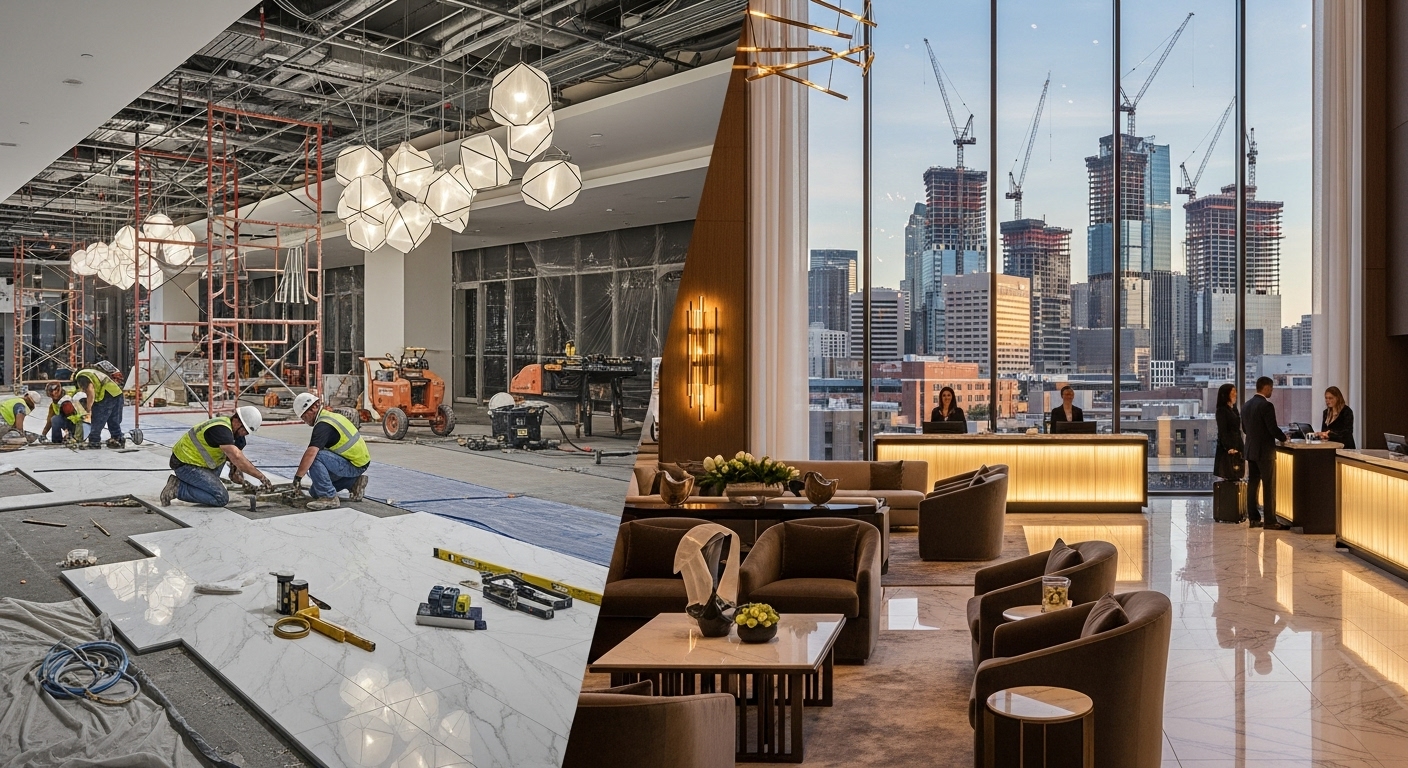Based on the provided information, I’ll create an SEO-optimized blog post targeting hospitality and hotel owners in Fort Worth, TX. Let me first gather some additional context about Fort Worth’s hospitality construction trends.Now I’ll create an SEO-optimized blog post for Alder Designs, targeting hospitality and hotel owners in Fort Worth, Texas. Based on the research and information provided, I’ll focus on Fort Worth’s construction boom and hospitality renovation opportunities.
Fort Worth’s Hospitality Renaissance: How Strategic Hotel Renovations Are Driving Texas’s $1 Billion Construction Boom
Fort Worth, Texas is experiencing an unprecedented transformation. With over $1 billion in active construction projects reshaping the city’s skyline and hospitality landscape, hotel owners and operators are positioned at the center of one of the most significant economic expansions in the state’s history. As the Dallas-Fort Worth metropolitan area continues to lead the nation’s hotel development pipeline with nearly 200 projects, the opportunities for hospitality modernization and strategic renovations have never been more compelling.
The Fort Worth Construction Renaissance
The numbers tell a remarkable story. Fort Worth-Arlington ranks fifth nationally in new hotel project announcements, with 7 projects totaling 1,145 rooms entering the development pipeline in Q3 2024 alone. This surge in hospitality construction represents more than just new inventory—it signals a fundamental shift in how travelers view Fort Worth as a destination and business hub.
Major developments are transforming downtown Fort Worth, including the Texas A&M-Fort Worth campus expansion, Convention Center renovations worth $700 million, and new mixed-use developments that will attract business travelers, conference attendees, and leisure visitors. These infrastructure investments create a ripple effect, driving demand for upgraded hotel accommodations that can compete in this elevated market.
Why Hotel Renovations Are Critical in Today’s Market
As Fort Worth evolves into a premier Texas destination, existing hotels face both tremendous opportunity and increasing competition. Recent data shows that hospitality construction costs range from $260-$450 per square foot, making strategic renovations a smart alternative to ground-up development for many property owners.
The Highland Dallas, Curio Collection by Hilton, recently completed a bold renovation that demonstrates how thoughtful modernization can reposition a property. Their art-led redesign and complete reimagining of guest rooms and public spaces showcase the potential for existing hotels to not just compete, but lead in the transformed market.
Key Renovation Opportunities for Fort Worth Hotels
Guest Room Modernization
- Updated HVAC systems for energy efficiency and guest comfort
- Technology integration including USB charging stations and smart room controls
- ADA compliance upgrades to meet current accessibility standards
- Bathroom renovations with modern fixtures and improved functionality
Common Area Enhancements
- Lobby redesigns that create memorable first impressions
- Meeting and event space upgrades to capture growing corporate demand
- Food and beverage venue improvements
- Fitness and wellness facility modernization
Infrastructure Improvements
- Electrical system upgrades to support modern technology demands
- Plumbing improvements for reliability and efficiency
- Fire safety and security system enhancements
- Energy-efficient lighting and building automation systems
Fort Worth’s Economic Drivers Creating Hotel Demand
The city’s $1 billion construction boom isn’t happening in isolation. Several key factors are driving sustained demand for quality hotel accommodations:
Corporate Growth and Relocations
Major corporations continue choosing the Dallas-Fort Worth region for expansion and relocation, bringing business travelers who need quality accommodations. The area’s business-friendly environment and strategic location make it a magnet for corporate events and extended-stay business travel.
Convention and Event Tourism
The $71 million Convention Center upgrade positions Fort Worth to capture larger conferences and events. Hotels that can accommodate group bookings and provide modern meeting facilities will benefit significantly from this enhanced infrastructure.
Cultural and Entertainment Expansion
Fort Worth’s cultural district continues to grow, with new attractions and entertainment venues drawing leisure travelers. The National Juneteenth Museum and other cultural investments create year-round tourism opportunities.
Industrial and Logistics Growth
The region’s massive logistics and industrial expansion brings construction workers, project managers, and business travelers who need temporary accommodations during project phases.
The Competitive Advantage of Strategic Renovations
While new hotel construction dominates headlines, existing properties that invest in strategic renovations can capture market share more quickly and cost-effectively. Consider these advantages:
Speed to Market: Renovations can be completed in phases, allowing properties to maintain operations while upgrading systematically. This approach generates revenue throughout the improvement process rather than requiring complete closure.
Cost Efficiency: At $260-$450 per square foot for new hospitality construction, targeted renovations often provide better ROI by focusing improvements on high-impact areas that directly influence guest satisfaction and room rates.
Market Positioning: Well-executed renovations can elevate a property’s brand positioning, enabling higher average daily rates and improved occupancy in Fort Worth’s increasingly competitive market.
Construction Management in Occupied Environments
One of the biggest challenges facing hotel renovations is maintaining guest satisfaction and operational continuity during construction. This is where experienced construction management becomes crucial. Successful hotel renovations require:
Phased Construction Approach
- Strategic scheduling to minimize guest disruption
- Sound mitigation techniques for occupied areas
- Careful coordination of deliveries and contractor access
- Clear communication protocols with hotel operations staff
Quality Control and Timeline Management
- Detailed project planning to prevent delays that extend disruption
- Regular quality inspections to ensure work meets hospitality standards
- Coordination with hotel maintenance teams for seamless integration
- Fast-track scheduling for critical systems like HVAC and plumbing
Specialized Trade Coordination
- Electrical work that accommodates modern technology requirements
- Plumbing upgrades that improve efficiency without compromising service
- HVAC improvements that enhance guest comfort while reducing energy costs
- Fire safety and security system installations that meet current codes
Fort Worth’s Construction Market Outlook
Industry experts project continued strength in Fort Worth’s construction market through 2026. Commercial construction costs are expected to rise 3-6% annually, making current renovation projects more cost-effective than waiting for future market conditions.
The city’s infrastructure investments, including transportation improvements and utility upgrades, will continue supporting hospitality growth. Hotel owners who act now can position their properties to benefit from Fort Worth’s transformation while construction costs remain relatively stable.
Making Strategic Renovation Decisions
For hospitality owners evaluating renovation opportunities, several factors merit consideration:
Market Analysis: Understanding Fort Worth’s evolving guest demographics and demands helps prioritize renovation investments for maximum impact.
Competition Assessment: Analyzing what competing properties offer helps identify differentiation opportunities through strategic improvements.
Revenue Optimization: Focusing renovations on areas that directly impact room rates and occupancy—such as guest rooms, lobbies, and meeting spaces—typically provides the strongest ROI.
Operational Efficiency: Upgrading building systems can reduce long-term operational costs while improving guest experience, creating ongoing value beyond the initial investment.
The Role of Experienced Construction Partners
Successfully navigating hotel renovations requires construction partners who understand hospitality operations and guest experience requirements. The unique challenges of working in occupied buildings demand specialized expertise in:
- Project scheduling that minimizes operational disruption
- Quality control processes that meet hospitality standards
- Trade coordination for complex MEP systems
- Clear communication with property management teams
- Understanding of hotel operational requirements and guest expectations
Seizing Fort Worth’s Hospitality Opportunity
Fort Worth’s transformation presents a once-in-a-generation opportunity for hotel owners to position their properties for long-term success. As the city continues attracting business travelers, convention attendees, and tourists, properties that invest in strategic renovations will capture disproportionate value in this growing market.
The combination of major infrastructure investments, corporate growth, and cultural expansion creates sustained demand for quality hotel accommodations. Properties that modernize their facilities, improve operational efficiency, and enhance guest experiences will thrive in Fort Worth’s evolved hospitality landscape.
For hotel owners ready to capitalize on Fort Worth’s construction boom, the time for action is now. Strategic renovations completed while the market is still developing can establish competitive advantages that persist long after the construction cranes disappear from the skyline.
The question isn’t whether Fort Worth will continue growing—it’s whether your hotel property will be positioned to capture its share of this remarkable expansion. With the right renovation strategy and experienced construction partners, your property can not only compete in Fort Worth’s transformed market but lead it.


0 Comments